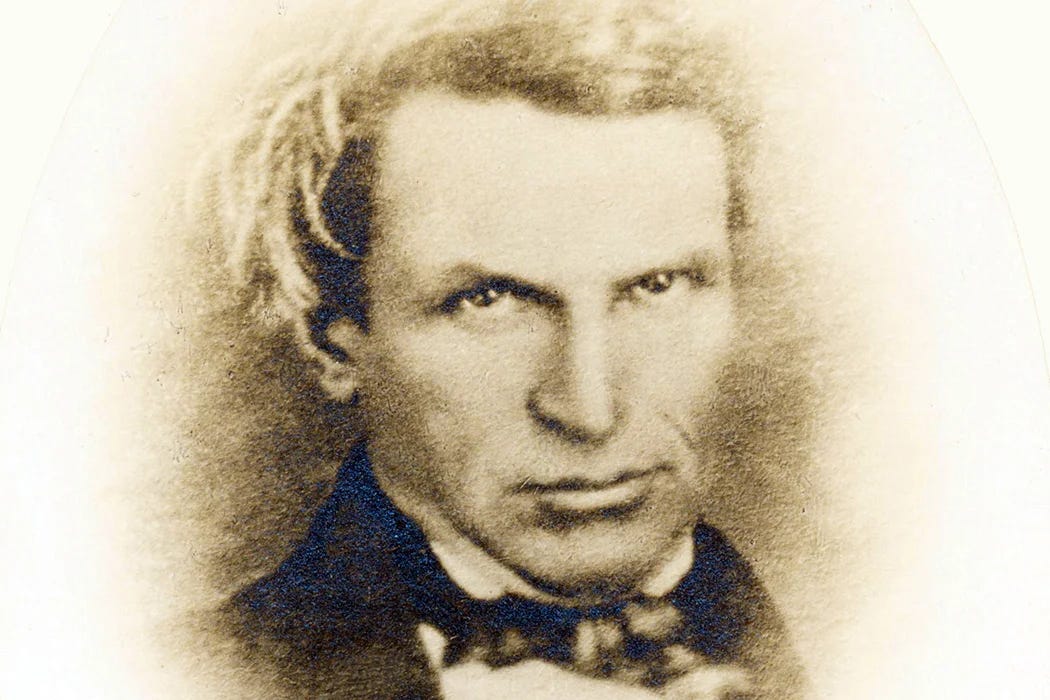History, Plausibility, Motivation
Day 124 of my Journey
(Dr. Charles Knowlton, looking a bit annoyed)
This morning I’m responding to Henry Oliver's piece about historical fiction:
First, I completely agree that rewriting the story of the 1952 London smog is stupid and will probably result in many viewers of The Crown being deceived about the actual history. It's a bit baffling to me, why the series' writers would even want to do that. Apparently they believed Churchill needed a character arc that fit within the period they were depicting? Where does the indifference to historical fidelity begin? Is it a slippery slope authors find themselves sliding down, as soon as they start inserting dialogue into the mouths of historical characters?
Henry says historical novels tell us "what else it [history] means". I think there's some truth to this. It's fair to say that many historians were focused on a very narrow slice of the things that happened in the past and people they happened to. One of the things novels have done, at least since Dickens, has been to give us views of big events (A Tale of Two Cities) from a much more personal perspective. There are conventions, since the reader is aware the story-world is not the real world. It would be a different story if space-ships or time machines suddenly appeared, and presumably these appearances would change the responses and motivations of characters.
I'm reminded of Neil Gaiman's use of an epigraph in Coraline which he attributes to G.K. Chesterton, that says, "Fairy tales are more than true: not because they tell us that dragons exist, but because they tell us that dragons can be beaten." But I'm also reminded of the tension I felt as an author, writing my biography of Dr. Charles Knowlton. One of the most interesting people in his life, I thought, was his wife Tabitha. But she left no records. No letters, nothing. So in order to "give her a voice", I would have had to make stuff up and turn my biography into a historical novel. Once I had done that, of course, I could also have made up conversations between Knowlton and Robert Dale Owen, Frances Wright, Abner Kneeland, and all the other contemporaries with whom I'm nearly certain he met and collaborated. I didn't do that. Thought about (still think about) writing some type of "extended biography" that goes on clearly fictional side-trips to explore some of these things.
Another thing that jumped out at me from Henry's post was the idea of plausibility. Obviously, as he demonstrated with the Churchill example, what might seem plausible motivation or character development to readers today might be wildly inaccurate for the time. But even so, I very often wonder about the actual motivations of characters in history. What did they really think? Especially, how much of what they said was sincere and how much was rhetoric or propaganda? Of course you can compare words and actions —Thomas Jefferson, for example— but that hasn't allowed me to decide whether I think Jefferson was fully conscious of the glaring hypocrisies of his life. I could make up a scene in an extended biography of Knowlton, where his friend Frances Wright could answer that question. She visited Jefferson and Madison when traveling with Lafayette on his "Farewell Tour" in 1824-5. The southerners apparently endorsed (or at least praised) her plan to emancipate the slaves of the South that she piloted unsuccessfully at Nashoba. I could put some words in her mouth about Jefferson's level of sincerity, but of course she would also be speculating. I'd have to shift points of view in a flashback to that scene, and let a fictional Jefferson reveal his own thoughts. Would this be interesting? Would there be a point? I guess the question of whether motivations are plausible can be applied equally to us in the present.


